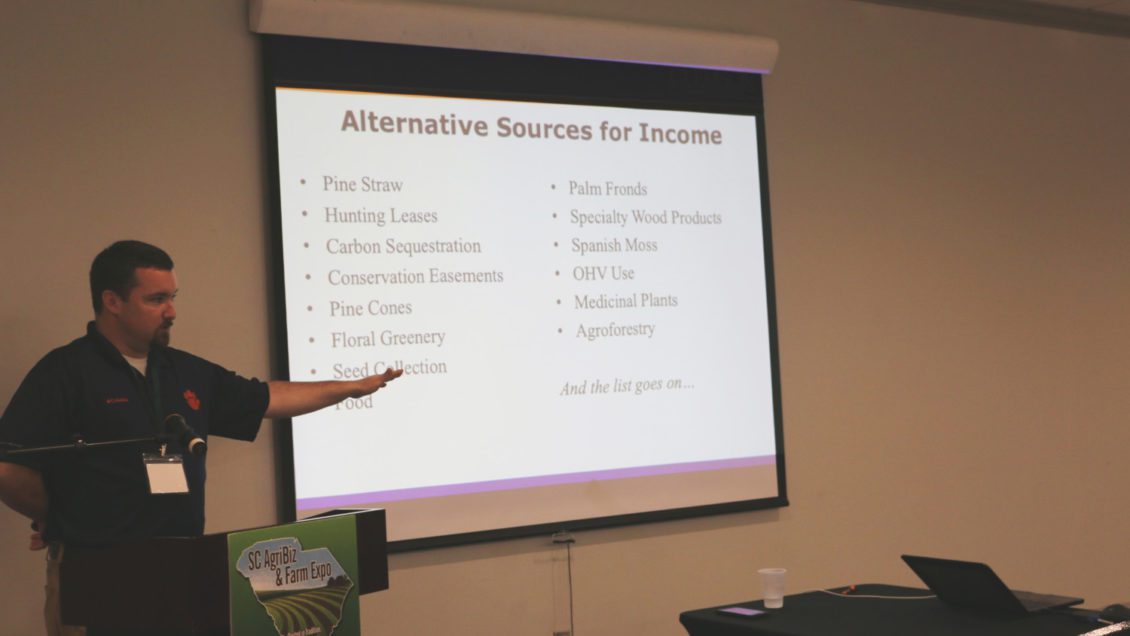FLORENCE – The South Carolina agriculture industry offers a lot more than just food and fiber, and Clemson Extension Service experts recently explained alternative sources of income to farmers, including opening their farms to the public.

During the 2020 South Carolina AgriBiz and Farm Expo held here in January, Clemson Extension agribusiness agent Will Culler talked about the South Carolina Ag + Art Tour. The tour has been “cultivating handmade and homegrown South Carolina experiences” since 2012.
“This is a free, self-guided tour of designated farms in South Carolina featuring local artisans and farmer’s markets,” Culler said. “During the tour, visitors see first-hand where their food comes from, watch artists in action and purchase their works, dance to the melodies of bluegrass and folksongs, and learn more about rural life.”
The tour rolls into 11 South Carolina counties this summer. Hours for the tour are from 10 a.m. to 4 p.m. on Saturdays and from 1-5 p.m. on Sundays. The 2020 Tour Schedule is:
- May 30-31 – Colleton County,
- June 6-7 – Newberry, Kershaw and Richland counties, and York County (East),
- June 13-14 – Chester, Chesterfield and Lexington counties, and York County (West),
- June 20-21 – Fairfield and Lancaster counties, and
- June 27-28 – Union County.
For more information, go to https://agandarttour.com/.
In another educational session, Clemson Extension area forestry and natural resources agent Ryan Bean, talked about alternative income sources for forest landowners in South Carolina.
“Forestry has an economic impact of $21.2 billion in South Carolina,” Bean said. “It is number one in jobs, number two in labor income and number three in direct economic output. But forestry isn’t about just lumber. There are other benefits you can get from your trees.”
Benefits Bean discussed include: pine straw harvesting, hunting leases, carbon sequestration, conservation easements and more. He also discussed the floral greenery market, seed collections, food, specialty wood products, Spanish moss, medicinal plants and agroforestry. James McLeod owns a tree farm in Lee County and attended Bean’s session. McLeod frequently uses information from the Clemson Extension Service to help manage his farm.
“This information is good to have,” McLeod said. “I’m especially interested in pine straw harvesting. I trust information from the Clemson Extension Service to help guide me in the direction I need to go with my tree farm.”
In another session, Clemson Extension wildlife and natural resources agent T.J. Savereno, provided landowners with information they can use to help restore beauty, health and use of farm ponds. Savereno said eutrophication is one reason good ponds go bad.
“Eutrophication is caused by an excess of nutrients that build up in ponds over a period of time,” Savereno said. “Over time, a pond will build up organic matter and, eventually, can change to a completely different system such as a marsh.”
Eutrophication is a gradual increase in the concentration of phosphorus, nitrogen and other plant nutrients in an aquatic ecosystem such as a lake or pond, as the water body ages. These nutrients come from the erosion of phosphate rocks; organic decomposition of wild animal waste, and decaying plants and animals, in addition to other sediments that may collect in a pond.
The eutrophication process can take hundreds of years to culminate as a natural process. However, it can be greatly accelerated by human activity such as livestock management, phosphate mining, contaminated water runoff, erosion and sedimentation, leaky septic systems and overfertilization of ponds.
Moderating the amount of nutrients in a pond to slow the eutrophication process can be a challenge for many landowners. Savereno said landowners can mitigate nutrient input and accumulation by using conservation management practices such as:
- Restricting animal access,
- Establishing vegetative buffers,
- Reducing sedimentation,
- Limiting excessive fertilization,
- Maintaining water flow,
- Encouraging aeration, and
- Maintaining an ecological balance.
Soil tests should also be used to mitigate excessive nutrients in farm ponds. These tests help landowners make decisions related to fertilizer and limestone applications for commercially grown crops, home gardens, fruit trees, ornamentals and lawns. They provide a scientific basis for maintaining optimum soil fertility levels and proper soil pH values to help attain maximum plant growth and economic yields while protecting against environmental hazards, such as contaminated runoff, resulting from excessive fertilizer applications.
To learn more about pond management practices, contact your local Clemson Extension county office. Clemson Extension also offers a Master Pond Manager course.
Other sessions provided by Clemson Extension agents included:
- Profitability Outlook for 2020 – Nathan Smith and Adam Kantrovich.
- Direct Marketing Best Practices – Steve Richards.
- Understanding and Utilizing Social Media in Marketing – Donna Bowen.
- Small Engine Use and Maintenance – Janet Steele.
- Realities of Pecan Production in South Carolina – Mark Arena.
- South Carolina Famer of the Year – Zack Snipes.
- 2020 Commodity Market Outlook and Strategies – Nathan Smith, Adam Kantrovich and Bernt Nelson.
- CAMM Conference – John Chastain.
- Blueberry Production in South Carolina – Bruce McLean.
- Vegetables as an Alternative – Tony Melton.
- Growing Commercial Blackberries and Peaches – Andy Rollins.
- Sod Production as an Alternative Crop – Jackie Jordan.
- A Look into the Christmas Tree Industry – Mark Arena.
This was the eighth year for the Expo.
-END-
Get in touch and we will connect you with the author or another expert.
Or email us at news@clemson.edu

